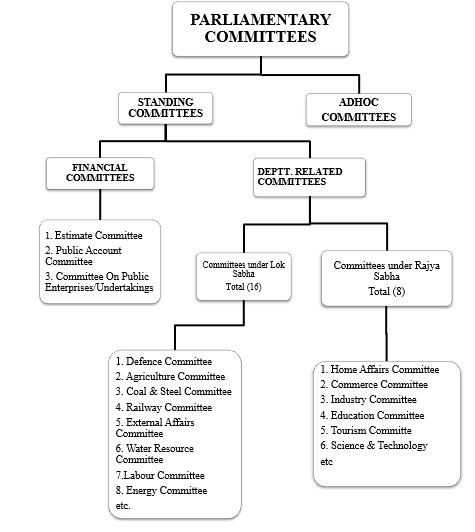Polity Notes
PARLIAMENTARY COMMITTEES
Parliamentary committees are committees of members of parliament to study and deal with various matters that cannot be directly handled by the Parliament due to their volume and content nature. Parliament makes law on various subjects. A member of parliament can’t be an expert in all fields.
Law making is a very cumbersome task and is done by experts in that field e.g., Union Minister for Women & Child Development Mrs. Smriti Irani on 21st December 2021 introduced-“Prohibition of Child Marriage (Amendment) Bill, 2021 to increase the minimum legal age of marriage for girls from 18 to 21 years across all religions.” This bill has been sent to a select committee for detailed study on this issue.
Parliamentary committees also monitor the functioning of the executive organ of the union government. The executive is the one of the organs of the government that implements law and has the responsibility for the governance of a state.

Parliamentary committees can be subdivided under two headings as:
I. Standing committees
II. Adhoc committees
STANDING COMMITTEES:
These committees exist all times, they are permanent in nature and perform their functions regularly.
Standing committees can be subdivided under two headings:
a) Financial Committees
b) Deptt. Related Committees
A. FINANCIAL COMMITTEES:
i. Estimate Committee (EC):
Estimate committee has 30 members. All are from Lok Sabha. Members are elected by Lok Sabha and their tenure is 1 year. Its chairperson is appointed by the speaker of Lok Sabha among members. A union minister cannot be a member of this committee. Estimate committee examines whether the money is well laid out within the limits of policy implied in the estimates. This committee suggests alternative policies for efficiency and economy is administration. Sh. Girish Bhapat is Chairperson of this committee.
ii. Public Accounts Committee (PAC)
Public Accounts Committee consists of 22 members (15 from Lok Sabha and 7 from Rajya Sabha). Members are elected by Lok Sabha and Rajya Sabha respectively. Tenure of members is one year. A union minister cannot be a member of this committee. This committee Audits the revenue and expenditure of government of India. Public Accounts Committee examines the audited report of C.A.G. after it is laid in parliament. C.A.G. assists this committee during the course of investigation. As a convention this committee is always headed by Leader of Opposition. Presently, Congress Leader Adhir Ranjan Choudhary is Chairperson of this committee.
iii. Committee On Public Undertakings
This committee has 22 members (15 from Lok Sabha and 7 Rajya Sabha). Members are elected by the Lok Sabha and Rajya Sabha respectively. Tenure is one year. This committee examines the Accounts of Public undertakings and consider the report of C.A.G. on Public undertakings, suggest ways to improve the efficiency and economy in working of public undertakings. A union minister cannot be a member of this committee. Mrs. Meenakshi Lekhi was chairperson of this committee but after her appointment as union minister of State- Foreign Affairs and Culture, she resigned from this post and now Santosh Gangwar is Chairperson of this committee.
B. DEPARTMENTAL RELATED COMMITTEES:
There are 24 Deptt Related Standing Committees. Each committee consists of 31 members (21 from Lok Sabha and 10 from Rajya Sabha). The tenure of each committee is not more than 1 year. Members from Lok Sabha are nominated by Speaker of Lok Sabha and members from Rajya Sabha are nominated by Chairperson of Rajya Sabha.
Some Other Standing Committees:
i. Business Advisor Committee
ii. Committee on Privileges
iii. Committee on Empowerment of Women
iv. Committee on Petitions
v. Rules committee etc.
AD-HOC COMMITTEES:
Adhoc Committees are temporary in nature. They are established for a particular purpose and after completion of that purpose, their presence ceases to exists e.g., Balwant Rai Mehta Committee was established in 1957 to review the working of community development programme and suggest ways for further improvement in the system. This committee submitted its report in 1978 and recommended establishment of Panchayati Raj System in India. After submitting its report this committee ceased to exist. Some of the examples of ad-hoc committees are
i. Balwant Rai Mehta committee, 1957
ii. Ashok Mehta committee, 1978
iii. Sri Krishna committee on Telangana, 2010
iv. Naresh Chandra committee 2012 on Defence
v. Five-year plan draft committee
vi. Hindi equivalent committee
vii. Railway convention committee
viii. Select & joint committee on bills